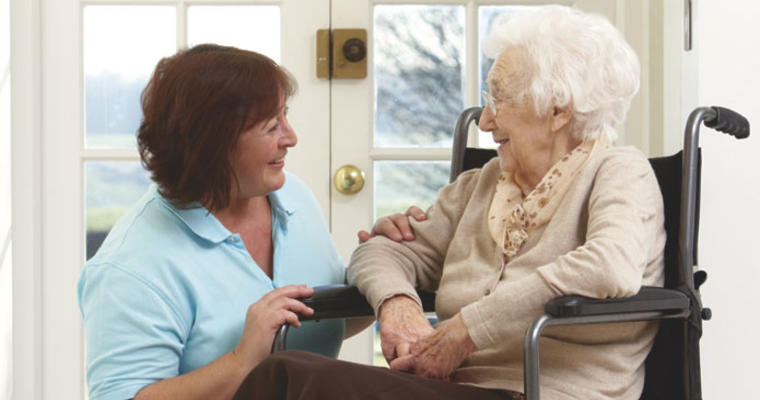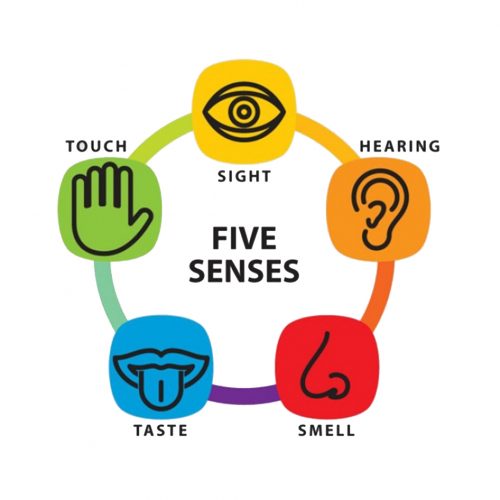Using all 5 Senses when Communicating with a Loved One with Dementia

Thank you to everyone who attended our webinar a few weeks ago on communicating with a loved one with dementia. We have presented this webinar several times and every time we gain a new appreciation for the compassion and creativity required for this important skill. (And for more about our upcoming events or to host a presentation for your organization, click here.)
When communicating with a loved one with dementia, it helps to frame the communication goal as one of engagement: Someone with dementia may not be able to understand every last detail of a talking point, but – with the right support – they will be able to have a meaningful connection and feel valued in the communication process. To that end, we’re excited to share with you how to stimulate all 5 senses when communicating with a loved one with dementia. This means thinking about how to incorporate:

The Sensory Roads
It helps to think of each of our senses as a road, linking the outside world and the things we experience with our brain so we can make sense of them and use that information to guide what we do. Younger and middle-aged adults typically have smoothly-paved sensory roads. If you can understand and think about the words you are reading now, it means your sense of sight or hearing is intact enough to allow that information to flow easily to your brain for you to process.
But when someone has dementia, those sensory roads are typically in some state of disrepair: They may have small cracks, or giant potholes, or parts of them may be closed entirely. (For more information about how dementia impacts the 5 senses, check out this article.)

So what does this mean for communicating with someone with dementia? It means that as communication partners, we need to utilize a variety of “sensory roads” in order to increase the chances that the information we want to share will be accessible for our loved one. If we only utilize one road to communicate with someone with dementia – and that road is in disrepair – we miss opportunities to successfully communicate with them.
Keep in mind also that sensory changes happen with typical aging, outside of dementia. An older adult without symptoms or a diagnosis of dementia will still experience age-related sensory changes such as decreases in visual and auditory acuity and an impaired sense of smell. So for older adults with dementia, these sensory changes are magnified even further.
Let’s explore this idea of sensory roads with the example of telling someone with dementia about their grandchild’s baseball game. Here are some ways we can communicate about the event that maximize the chances that our loved one will process some of the information we are sharing with them.
- Hearing: Talk slowly and in a low register. Use simple, concise language to describe the game. Incorporate sounds related to the baseball game, such as the crack of a bat against the ball, the thwack of a ball being caught in a mitt, or the crowd cheering. Play baseball-themed music, such as “Take Me Out to the Ballgame.”
- Vision: Be directly in front of your loved. Make sure there is sufficient light for them to see you, and minimize glare. Show your loved one pictures of the game. Don’t have pictures of the game? Show your loved one pictures of their grandchild or of baseball paraphernalia.
- Touch: Provide a gentle touch on your loved one’s arm or shoulder to support their attention to the conversation. Provide objects for them to touch and hold, such as a baseball glove, mitt, or jersey. If there is a special object or item that holds meaning for your loved one and their grandchild, include that as well.
- Smell: Bring a freshly-oiled mitt or a box of Cracker Jacks. It’s okay if their grandchild’s baseball game did not provide Cracker Jacks as a refreshment – the point is to help establish the association with baseball.
- Taste: That box of Cracker Jacks can do double-duty here. It is also a good time to ensure your loved one is hydrated: “It was really hot at the game and we drank a lot of water. Here, let me refill your glass now.”
As with many aspects of supporting dignity for someone with dementia, communication is often more about facilitating a meaningful process than the end-result of ensuring a thorough transfer of information. Practice reaching your loved one through multiple sensory roads when communicating with them, and you’ll notice a positive difference in your connection.
For special considerations of the 5 senses when a loved one with dementia is near the end of their life, we recommend this article by dementia expert Teepa Snow.
Looking for more support regarding a loved one with dementia? Reach out to us today. We’re here to help.



